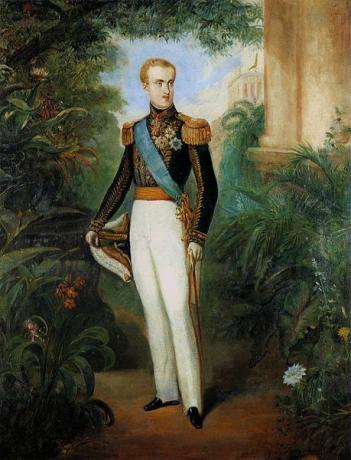When D. Peter I abdicated to the Brazilian throne, his son Pedro de Alcantara he was only five years old, thus unable to assume the throne. In this circumstance, in accordance with the Constitution of 1824 who should occupy the leadership of the country were the regents.
This period comprising the years 1831 to 1840 was known as Governing Period.
Marked by a deep political and social instability caused by popular rebellions that have spread throughout the territory, the alternative found by the political groups of the time was the anticipation of the prince's majority regent.

D. Pedro II thus became the second and last emperor of Brazil, remaining in power for forty-nine years (1840-1889).
The political instability that gripped Brazil during the regency period put pressure on the leaders government to take steps to contain the social upheavals that threatened political unity. national.
The political groups formed by liberals and conservatives believed that only the emperor could put an end to the disorder that was created. But since Pedro de Alcântara was only fourteen years old at the time, the liberals began a campaign to advance his majority, which received support from the conservatives.
the coup of coming of age
Liberals and conservatives launched a campaign in newspapers and magazines that came to be seen as an attempt to save the nation. In July 1840, the campaign achieved the desired goal and with fifteen years still unfinished, D. Pedro II assumed the Brazilian throne. This episode was known in history as the coming of age coup, thus beginning the Second Reign.
Elections in the Empire
During the reign of D. Pedro II, the Liberal and Conservative party stood out on the national political scene. Made up of farmers, merchants, civil servants and the military, these groups represented the Brazilian elite and left out the majority of the population from political decisions.
Liberals and conservatives used hidden means to guarantee the permanence of their privileges, the former wanted greater political participation, while the second advocated a centralized government that would guarantee the rights of groups dominant.
In the first legislative elections, liberals managed to win the elections thanks to the use of violence and fraud, during the process, ballot boxes were stolen, henchmen beat opponents, results were modified, etc. For these and other reasons, it became known as clubbing elections.
The arrival of the liberals to power brought some political stability to the country, as they took a stance that did not interfere with the economic interests of conservatives. However, the peace was short-lived, conservatives unhappy with the result pressed the emperor to call new elections. D. Pedro II dissolved the Chamber and called new elections that this time were won by the conservatives. Liberals tried to react but were defeated. In 1847, the parliamentary regime was established in the country, in which the prime minister, chosen by the emperor, appointed the other ministers.
Brazilian Parliamentarianism
In 1847, D. Pedro II created the position of president of the Council of Ministers, this one was responsible for choosing a ministry that was subordinated to the approval of the Chambers of Deputies.
If the ministry was approved, it was released to govern. However, the emperor's will was above all other groups, thus the Parliamentarianism of the times of the second empire was known as Parliamentarianism à Brasileira.
Second Empire Economy
- Free Online Inclusive Education Course
- Free Online Toy Library and Learning Course
- Free Online Math Games Course in Early Childhood Education
- Free Online Pedagogical Cultural Workshops Course
In the government of D. Pedro II, coffee became the main agricultural product to be produced and exported. Brought from the African continent, coffee entered Brazil in the 18th century, more precisely in the year 1727 by Belém, in the state of Pará.
The first seedlings were planted in the backyards of the house, production would expand with the increase in consumption of the product in Europe and the United States.
From the nineteenth century, the habit of drinking coffee became a fad among Europeans and North Americans, this increase in consumption promoted the expansion of coffee plantations in Brazil. The coffee growers saw in coffee the opportunity for enrichment, in their favor they had soil and climate favorable to planting. In a short time, coffee would become the Brazilian product most exported abroad.
From 1760 onwards, coffee plantations occupied the coast of Rio de Janeiro, the Paraíba Valley (a region between Rio de Janeiro and São Paulo), the Zona da Mata Mineira and the west of São Paulo. Intensive cultivation caused great soil depletion, which forced coffee growers to expand their planting areas.
In addition to boosting the country's economy, and making Brazil recognized worldwide, coffee also promoted the enrichment of coffee growers who came to be called “coffee barons”. The prosperity generated by this product stimulated the modernization of the country, mainly in the Southeast region. The profits achieved with the export of coffee were also invested in the construction of railroads that facilitated the flow of production.
In 1854 the first railroad was inaugurated, it connected Guanabara Bay to Petrópolis. In 1858, the Railroad D. Pedro II, who transported coffee from Vale do Paraíba to the port of Rio de Janeiro.
The wealth generated by coffee not only stimulated the construction of railways, but also benefited the development of industries, banks, mining companies, urban transport, lighting, etc. Part of these projects was financed by businessman Irineu Evangelista de Souza, known as Barão de Mauá.
The Alves Branco tariff that increased taxes on foreign products and the enactment of the Law Eusébio de Queirós, who forbade the slave trade, contributed to the economic stability of the empire. Capital that was destined for the purchase of foreign products and the acquisition of slaves was now invested in new businesses.
Coffee was the main product of the Brazilian economy, but other products were also exported, such as sugar, cotton, cocoa, tobacco, leather, skins and rubber. Products intended for internal supply were also of great importance, as cattle raising, food and textile production boosted trade between the provinces.
The End of the Slave Traffic
England was one of the main metropolises involved in the African slave trade in the Atlantic Ocean. But in 1807 she decided to change her stance and prohibit the sale of slaves to her colonies and fight the African trade in other regions.
The initiative was a way to guarantee the sale of its industrialized products to a greater number of colonies, since the Industrial Revolution considerably increased its production.
The British aimed to sell their products to Brazil, but as a large part of the coffee growers' income was reinvested in the purchase of slaves, it was necessary to abolish this practice so that the money could be invested in the purchase of their products. Furthermore, if abolition took place, blacks could become wage workers and buy products from England.
In 1845 the English government enacted the Bill Aberdeen Act, which authorized English ships to seize or sink slave ships, if arrested the traffickers were to be tried in England. As trafficking continued, the Brazilian government was pressured in 1850 to approve the Eusébio de Queirós Law, which prohibited the entry of slaves into Brazil. The measure did not end slavery, on the contrary, it encouraged interprovincial trafficking.
The pressure to end slavery remained until 1888, when the Golden Law has been signed. Abolitionism was harshly fought by coffee growers who pressured the government to continue the practice. As work on the coffee plantations was mostly done by slaves, abolition could represent a serious blow to the economy.
the republican coup
The completion of abolition started a serious crisis in the empire. With the enactment of the Golden Law, D. Pedro II lost the support of the slave farmers who started to defend the establishment of the republic together with social groups, including the military.
The strengthening of the Republican Party favored the coup that removed the prime minister of the monarchic government from power. D. Pedro II was forced into exile in Europe along with his family, so in 1840 the second reign and the monarchic regime in Brazil came to an end.
Lorena Castro Alves
Graduated in History and Pedagogy
The password has been sent to your email.

